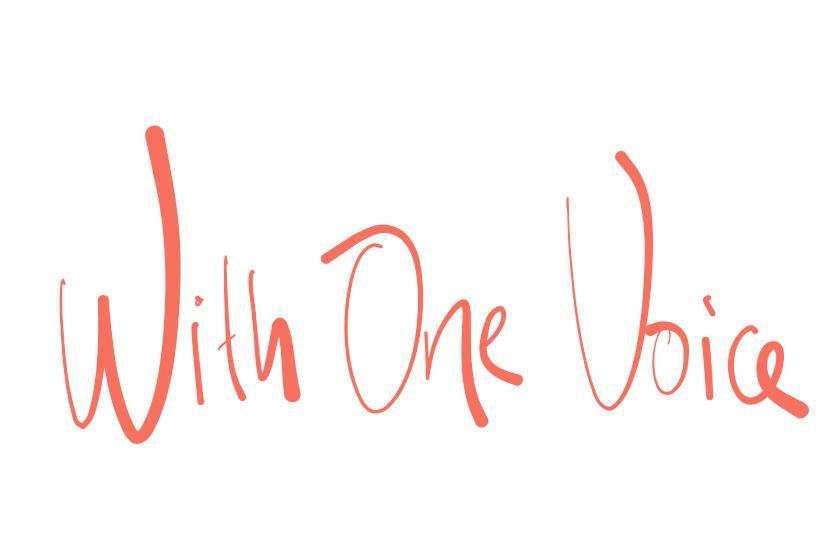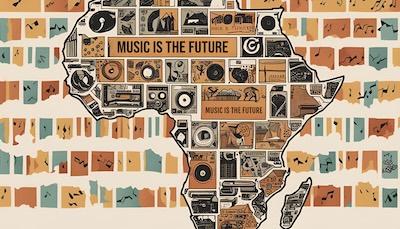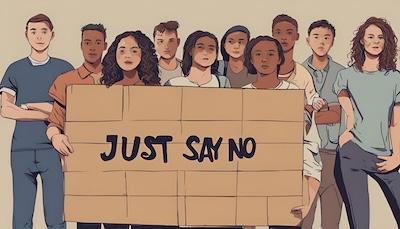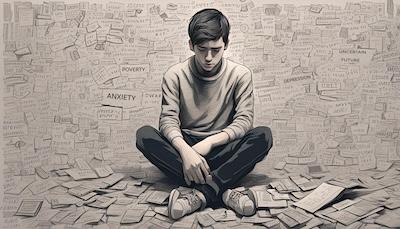
With One Voice - August 2024
Available in English, French, Spanish, and Portuguese
This month's With One Voice shines a spotlight on the inaugural African Music Academy Awards. We discuss learning from the past regarding unsustainable business models, a guest column from SADAIC CEO Guillermo Ocampo on AI, a highlight on mental health concerns for musicians, and technological opportunities not to forget about for music creators outside of AI.
Latest CIAM News:
- Joint letter to Members of the European Parliament on the impact of Artificial Intelligence on the European creative community
- The African Music Academy announces the overall winners of its first prizes.
- Camille Awards 2024: nominees announced
- Streaming services to be required to finance culture in Canada with new online act
- Generative AI, improving mental health, and collaboration bring authors’ rights society leaders and CIAM together in Seoul
- APMA welcomes Korea creators and CIAM to joint meetings in Seoul
- CISAC Creators Conversations: Episode 1 and the success of Korea
Sign up to receive the With One Voice newsletter here.

Heralding Africa’s musicians with inaugural AMA Awards
Created in 2014, the African Music Academy has been working to make the history of African music from the continent and diaspora the foundation of its activities while also uniting professionals, organizations, associations, and programs. The Academy, whenever possible, identifies areas to improve, whether it is creating new actions, organisms, or programs to fill gaps. In 2024, the inaugural AMA Awards were launched and announced its final laureates this June 20th. The full list can be found here.
The six overall laureates include those for Author, Composer, Performer, Musician, Executive Producer, and Manager. Nominated by local organizations, these laureates were chosen as those embodied for each category. The AMA Awards start with laureates on a national level, which then get narrowed down to regional before the overall 2024 laureates are declared, each laureate turning into voter for the next level.
The 2024 AMA Award overall laureates all become the first members of its Honorary Committee. Laureates also will receive support for their career, including training, management on copyright and neighbouring rights, and professional support for their works.
Each laureate will receive their award throughout the year where they work, helping share and spread the message and goals of the Academy.
On July 3rd, the Academy met virtually with laureates, delegates and professional organizations to build rapport and early communication among members, partners and sponsors. The multi-lingual meeting the event was hugely appreciated by all the attendees as a first step into carrying forward the transatlantic conversation which african music, as such, has always been.

Let’s Not License Unsustainable Business Models
Daniel Eck, CEO of Spotify, is not exactly beloved by many of us who make music. And it is important to remember that Mr. Eck went from being a “pirate” who “stole” music as the head of an illegitimate file sharing platform, to being the CEO of a legitimate music business model largely due to one thing: We (the music industry) granted Spotify licenses to use our music.
In terms of royalties however, the difference between “piracy” and the amount of money Spotify pays music creators even for millions of streams, is an unsustainable pittance. In other words, we creators went from exactly zero revenue from “piracy” to practically zero revenue from current license models like Spotify.
And we should never let that happen again.
Going forward, let’s learn from this untenable situation, and not legitimize unsustainable models by not licensing them to use our collective music in the first place.
By all means, let’s work with innovators, technology companies, and even generative artificial intelligence platforms to develop business models that can sustain and support individual flesh and blood human beings who create music, and of course, other artistic pursuits as well.
Let’s just say no to models that will not, or cannot support the people who make the music, the books, the paintings – all the creative arts that enrich our lives.
Let’s say yes to models that fairly and equitably remunerate human creators, without whom all of these business models would simply not be possible.

Some questions about Artificial intelligence
The phenomenon of music composed by AI raises a series of concern regarding its impact on authors and composers.
A study carried out jointly By SACEM and GEMA says that-according to those surveyed-in a relatively short period of time, the use of music created by AI will be approximately 30% of the total music used.
Beyond the fact that it is difficult to determine “a priori” the greater or lesser success of technology in the future, the expectation that authors and composers have in this regard is still disturbing and, if confirmed in reality, puts in check the economic scheme in which their creative activity is developed.
Will collective management societies have to collect rights in cases where music created by AI is used? Or, will the only act when it is music composed by human beings? If it were the latter case, will there be an offer of works to use for free? What would be the economic impact of this unequal competition? Or, if we want to avoid this unequal competition, a system should be promoted that allows royalties to be collected for the sole use of music, regardless of who created it- the human person or AI?
All questions that are difficult to answer.
Legislation on AI tends to promote its use due to its importance in the development of humanity, but regulating the unintended consequences of improper use of the system.
The impact on the rights of authors and composers is one of those unintended consequences.
The best defense is the promotion of collective management societies and their activity in the defense of creator´s rights.
The biggest challenge is to admit that this new reality forces us to review current models.
The response we give will be very important to safeguard the rights of creators.
In my opinion, if we intend to maintain the traditional model, we can lose more than we gain.
On the contrary, if we are proactive we will find the system that best suits the challenges that technology poses to us.
Guest columnist: SADAIC CEO Guillermo Ocampo

Dreams turn into Nightmares
Rick Rubin says in his book “The Creative Act: A Way of Being” ;
“People who choose to do art are, many times, the most vulnerable”.
“If you see tremendous beauty or tremendous pain where other people see little or nothing at all, you’re confronted with big feelings all the time. When those around you don’t see what you see and feel what you feel, this can lead to a sense of isolation and a general feeling of not belonging, of otherness.”
He is correct; a look into history will reveal dozens of cases of famous artists and music creators who shook us at the time.
But those cases are just the tip of the iceberg, and today, more than ever, we have a real crisis threatening our community's survival.
Some organizations are taking notice and taking action. For instance, KODA presented a study they made in collaboration with the University of London and Westminster during the recent CIAM ExCo in Seoul.
The study, in line with other global studies, suggests that the music career is a significant factor in the prevalence of anxiety and depression.
A 2022 survey by the charity Help Musicians found that 87% of musicians had experienced mental health problems, compared to 65% in the general population.
The Music Industry Research Association (MIRA) in collaboration with Princeton University and the MusiCares Foundation revealed that musicians are three times more likely to experience depression than the general public.
The University of Melbourne's Centre for Mental Health conducted a study revealing that musicians have a higher prevalence of mental health issues compared to the general population.
Ironically enough, music has been part of the quest to help people who deal with mental health issues while our music creators are suffering the most.
There isn’t a silver bullet or a magic remedy, but it is essential to recognize the problem and then fix it step by step during this crisis.
One crucial step is to keep advocating for fair remuneration for their work. Following this, it’s imperative for every CMO to conduct surveys to gauge the depth of this issue in their communities and take decisive action.
Otherwise, the next generations will skip the chance to become one of the few reasons that stop the human race from the dangerous path to isolation and loneliness.
For more detailed information and resources, you can visit the websites of Help Musicians, Active Minds, and Harvard Public Health Magazine.

AI is "So Yesterday"
I don't know about you, but if I read another article about AI, I will need to move to another planet.
Don't get me wrong, I have been talking about AI for years, and even if I still think its use should be regulated (especially in our industry), AI it's a powerful tool that enhances the creative process and opens up new possibilities.
But enough of this, let me tell you about other technologies that will change (again) how we monetize our work.
1. Mixed Reality (MR)
The first steps of these new technologies have been challenging. Meta and Apple have lost a lot of money betting on their growth. However, expectations around virtual reality and augmented reality remain optimistic.
But why are VCs and hedge funds still investing heavily in these innovations?
Opportunities for Music Creators
Immersive Concerts and Performances:
- MR can transform live performances by adding interactive digital elements, creating a more engaging and immersive experience for audiences.
- Virtual concerts can reach a global audience, breaking geographical barriers and increasing accessibility.
Interactive Music Videos:
- Music videos can integrate MR elements, allowing viewers to interact with the content in real-time, creating a more personalized experience.
- Fans can explore different scenes and elements of a music video through MR, making the experience more engaging.
Fan Engagement:
- MR can offer new ways to engage with fans, such as virtual meet-and-greets, interactive album releases, and immersive storytelling experiences.
- Fans can experience backstage access and exclusive content through MR applications.
Data and Statistics
- The global AR and VR market was valued at USD 18.8 billion in 2020 and is expected to reach USD 296.9 billion by 2028, growing at a CAGR of 63.3% from 2025 to 2030.
- By 2025, there will be an estimated 1.7 billion mobile AR user devices worldwide, up from 600 million in 2020.
- The number of VR users in the US is expected to reach 65.9 million by 2025, up from 58.9 million in 2020.
2. Holograms
Transforming Live Performances
Virtual Concerts: Holographic technology can create lifelike 3D representations, allowing for virtual concerts that can be experienced anywhere in the world.
Posthumous Performances: Holograms can bring deceased artists "back to life" providing a new way to experience the music of legends like Michael Jackson.
Interactive Experiences: Fans can interact with holographic versions of their favorite artists, enhancing the live concert experience.
Data and Market Insights
Market Growth: According to MarketsandMarkets, the market size is projected to grow from USD 2.7 billion in 2020 to USD 8.4 billion by 2028, at a CAGR of 14.0%.
Consumer Demand: There is increasing consumer interest in immersive and interactive entertainment experiences, driving demand for holographic technology in the music industry.
3. Casual Gaming
Why Casual Gaming is an Opportunity for Music Creators
Wide Audience Reach:
- Casual games have a broad demographic, appealing to all age groups and genders. This diverse audience provides a large potential listener base for music creators.
High Engagement:
- Players often spend significant time on games, leading to prolonged exposure to in-game music. This enhances the chances for music to be heard repeatedly, increasing familiarity and appreciation.
Monetization Opportunities:
- Music creators can license their tracks to game developers, earning royalties and exposure.
- Games often feature in-game purchases, which can include exclusive music tracks or soundtracks.
Branding and Marketing:
- Associating music with popular games can enhance a music creator’s brand, leading to increased recognition and potential cross-promotion opportunities.
Creative Expression:
- Games provide a platform for music creators to experiment with different genres and styles, as game soundtracks often require diverse musical elements to match various game scenarios.
Data Supporting the Opportunity
- Market Size and Growth:
- The global gaming market was valued at over $159 billion in 2020 and is projected to reach over $400 billion by 2030, with casual gaming making up a significant portion of this market.
- User Demographics:
- According to a report by the Entertainment Software Association (ESA), 65% of American adults play video games, with 60% playing on mobile devices, a popular platform for casual games.
- Engagement Metrics:
- Casual gamers typically play multiple sessions per day, with the average session lasting 5-10 minutes. This frequent engagement increases the likelihood of music being heard multiple times.
- Revenue Streams:
- Mobile gaming, which includes many casual games, generated $77.2 billion in revenue in 2020. A portion of this revenue comes from in-game purchases, including music tracks.
- Game Popularity:
- Popular casual games like “Candy Crush Saga” and “Angry Birds” have millions of daily active users. Integrating music into such widely played games lead to massive exposure for music creators.
Conclusion:
It's still a mystery which technologies will emerge as a boon or a foe for the next ten years.
The opportunities will multiply as long we continue to fight to protect copyright and every other creator's rights.
Ultimately, information and knowledge is the only way to survive the next big thing or to take advantage of the most significant era for the music business.
